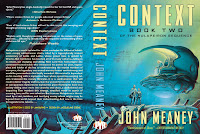Adam Balm is back with another SF book review for Aint It Cool News, this time with a very astute review round-up that includes his thoughts on Justina Robson’s Keeping It Real and Adam Robert’s Gradisil.
and Adam Robert’s Gradisil.
 After a review of the novelization of Spider-man 3, Adam proclaims Keeping It Real, ” a novel that … tears apart all genre conventions and mixes them together into something new. …In a male-dominated industry, this is a novel written by someone channeling their inner teenage girl, writing for teenage girls.”
After a review of the novelization of Spider-man 3, Adam proclaims Keeping It Real, ” a novel that … tears apart all genre conventions and mixes them together into something new. …In a male-dominated industry, this is a novel written by someone channeling their inner teenage girl, writing for teenage girls.”
Then he goes on to suggest that Justina may be carving out new territory in a direction necessary for the very health and survival of the genre. As he writes:
“Last month I spoke about SF needing to change or die. In an essay by Kristine Kathryne Rusch that appeared in Asimov‘s last year ‘In [2003], SF counted for 7 percent of all adult fiction books sold. In 2001, SF counted for 8 percent. The literary trend spirals downward while the media trend goes up. Half the new television dramas introduced in 2005 were science fiction, fantasy, or had a fantastic element. Most of the movies in the top twenty for the past five years have been SF. Nearly all of the games published have been SF.’ The print SF world has been falling behind for decades. It can expand to reach out to this new audience, or it can continue to be incestuous and cannibalistic. Right now the only entry point for new readers is media tie-ins. But Keeping it Real may turn out to be one example of the change that SF may want to embark on. Because this isn’t SF for SF readers. This is SF for a generation raised on anime, manga, and MMORPGs. This is SF for the Wii gamer. “
A discussion of Orson Scott Card’s Space Boy follows. Then, turning his attention to Gradisil, Adam invokes the connection to the Ansari X-Prize as he says:
“This wasn’t the top-down space travel we were promised in 2001. This is bottom up. This is tweakers and hackers seeing how far they can push technology by themselves. This is the future that Gradisil explores. Modeled after Aeschylus’ Oresteia trilogy of greek tragedies, it’s a multi-generational saga of man’s colonization of the high frontier of low-earth-orbit. It’s epic SF in the vein of Kim Stanley Robinson’s Mars trilogy or Allen Steele’s Coyote trilogy, although it feels like it could have been written in the days of Heinlein. And perhaps most profoundly, it’s a story about two Americas: The America that WAS (reflected in the rustic frontiersmen of the uplands) and the America that IS (reflected in the ambitious and expansionist US that launches a war to gain dominance of the new frontier.)”
The America that WAS (reflected in the rustic frontiersmen of the uplands) and the America that IS (reflected in the ambitious and expansionist US that launches a war to gain dominance of the new frontier.)”
Adam goes on to say that our Adam’s book isn’t engaged in “trying to writing about something new, it’s trying to write new about something,” and then concludes:
“There’s an old saying about good science fiction: Pick one. You can have good science or you can have good fiction. You have your Hal Clements, your Poul Andersons and Gregory Benfords whose science are unassailable but whose dialog and characterization are barely above Star Wars fan fiction; and then you have your Ursula Le Guinns, your Samuel R. Delanys, your J.G. Ballards and Brian Aldisses who are as interested in science as The Prisoner was interested in the criminal justice system. In choosing between good science or fiction, Adam Roberts works incredibly hard to reach the former, but he achieves the latter effortlessly.”
 Nick Gevers weighs in on Ian McDonald’s forthcoming Brasyl
Nick Gevers weighs in on Ian McDonald’s forthcoming Brasyl in the April edition of Locus magazine:










